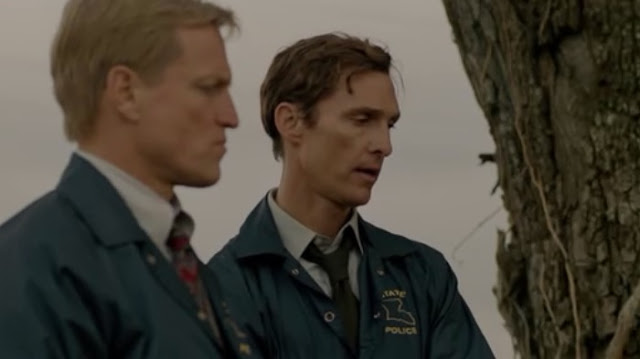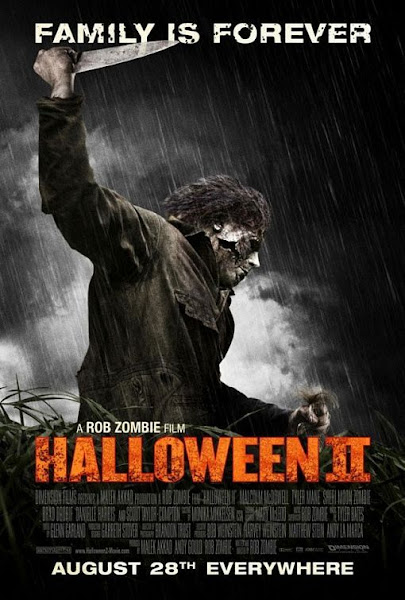True Detective -- Season One (Review)

True Detective
2014 HBO
Season One
SCORE: 8/10
I know I am late to the True Detective party. I do not currently have the Home Box Office Channel. Thankfully, no one I know has mentioned anything specific about this show to me, so I came in blind. All I knew was: Woody Harrelson and Matthew McConaughey were in a TV show, that show received a lot of acclaim, and it was filmed and took place in my home state of Louisiana. Over about I week, I've watched all eight episodes. Thanks, Amazon. I mean it. Here is a relatively spoiler-free review of True Detective Season One.
True Detective is a limited series, composed of eight hour long episodes. While there will be second season of True Detective, the story told and characters told of in this first season standalone. Obviously, I rated this an 8/10 because I don't think it is perfect. Let's get the bad out of the way first.
The most shocking element of this series to this swamps of Louisiana born-and-raised reviewer is that True Detective was actually written and created by a fellow Louisianan, Nic Pizzolatto of Lake Charles. I say this...I write this, because as I watched the show, the local flavor felt off. True Detective takes place entirely in Acadiana, or Cajun Country. The vast majority of Acadians are white and Catholic. The music of Acadiana is cajun and zydeco. So while the show's Acadiana-shot locations look authentic, the stereotypical gospel music soundtrack and staged Protestant Tent Revivals seem like they should exist a few hundred miles away. Most of the show's last names (including the Woody Harrelson-portrayed protagonist) are Anglican: Hart, Tuttle, Lange. There are some Fontenot's and Theriot's, but they are on the periphery. Considering the show-runner is from Lake Charles, the details should have been tighter. Then again, maybe it's better that they weren't. Ever hear of Southern Hospitality? Cajun Country is the heart of this concept. With that said, the viewer will be hard pressed to find a positive-portrayal of anyone from the region. Good old boys who cheat on their wives, loose women, crooked preachers, and rape and death cult members--that is all you're going to get. It's the typical cinematic portrayal of Louisiana. I guess I should just be thankful there aren't any racists. It's a shame that one of our own couldn't do it right, but perhaps Pizzolatto grew up sheltered in a Lake Charles suburb and learned about the rest of the state from TV and movies, just like everyone else. Or perhaps there just wasn't any way to do his home state right and still tell the story he wanted. I believe it is the latter, as Pizzolatto makes sure to name-drop as many Louisiana towns as possible throughout the show's run--a consolation prize for authenticity. Conversely, the recently ended first season of Fargo (another limited series show, which I will soon review), while featuring its fair share of weirdos, freaks, and psychos, was able to portray a large amount of its Minnesota dwellers as good, salt-of-the-earth people. Granted, the shows' morality systems, Fargo's black and white to True Detective's muddy, muddy gray (at least until its latter moments), differ, but still.
True Detective's plotting is also a bit...convoluted. While the show is most dedicated to the relationship of the two leads, cleaning up a few plot details would have been nice. I'm all for certain ambiguities in the details, and in fact, I'll be praising some of those in a moment, but there are certain elements of the death cult (particularly which demographic they actually victimize, who did the victimizing, etc.) that should have been drawn a little sharper. The entire plot is essentially one enormous loose thread, which is fine to an extent, as the two leads' relationship matters most, but this is still problematic to the quality of the season.
Finally, like many modern shows, True Detective attempts to play the self-righteous feminist (check the speech the prostitute gives Harrelson in the second episode), but the viewer can be sure, if a beautiful woman pops up on screen, that woman will eventually appear naked, filmed at every angle. For some reason, the guys always keep on their clothes. It isn't television, it's HBO.
Now to the good. I've mentioned the relationship between the two leads. Much like FX's The Bridge, the relationship between True Detective's two detective's is by far the show's strongest element. Hearing the old-fashioned, rational Harrelson character once again make the mistake of asking the nihilist, unhinged McConaughey character a simple question, only to receive a long-winded, nonsensical answer, is one of the great pleasures of modern television. Watching these two men slowly learn to respect one another, while still staying true to character is a wonderful experience. The show mines both humor and pathos from this, its strongest element, and wonder of wonders, the two of them actually develop and change! The character interplay gives the show a massive beating heart, and makes True Detective more than worth watching. The show features a few other minor players, but no other character gets to be drawn so fully. This is the Harrelson/McConaughey show, and the two leads shoulder the burden admirably. While McConaughey will deservedly get accolades for his brooding, off-the-wall performance, Harrelson also deserves credit for the emotional gauntlet he convincingly portrays his character inflicting upon himself.
While I complained about the filmmakers bungling the details of the setting, True Detective does do an excellent job of creating a setting, and a mounting feeling of dread. The unfathomable evil the detectives face is well-crafted as something that may be more than natural. The show contains elements of cosmic horror (meaning, the terror could be oozing from another plane, possibly from a realm we cannot even begin to comprehend), but allows the viewer to put as much emphasis on this as they want. One tantalizing shot near the end of the final episode is particularly delicious for those who want the show to go in that weirder direction, but it can also be summarily dismissed by those who don't care for such a thing. These sort of loose threads are great--they add to the mythology of the show, allow viewers fun conspiracy theories, but don't detract from the show's greater purposes.
True Detective is beautifully shot--a cinematic treat. Of particular note is the hypnotic opening credits sequence, which highlights the show's weirder vibes. In the end, it is those weirder vibes, along with the relationship between the two leads, that lifts True Detective above the pack.


Comments